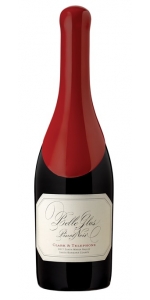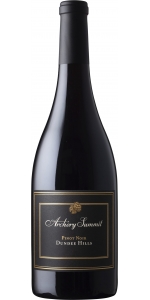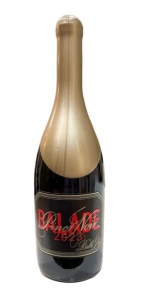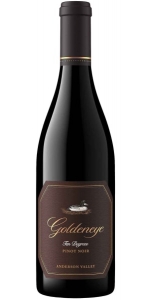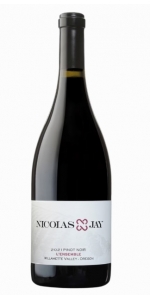Maysara 3 Degrees Pinot Noir 2020
| Country: | United States |
| Regions: | Oregon Oregon (Willamette) |
| Winery: | Maysara Winery |
| Grape Type: | Pinot Noir |
| Organic: | Yes |
| Vintage: | 2020 |
| Bottle Size: | 750 ml |
Maysara 3 Degrees Pinot Noir is 100 percent Pinot Noir
Aged 11 months in neutral French oak barrels
3° (Three Degrees) Pinot Noir is handcrafted by the Momtazi sisters whose differing personalities; combined with elegance, finesse and balance, reflect the dynamic characteristics of the Momtazi Vineyard. The sisters, Tahmiene, Naseem and Hanna, set out to make a pinot that tastes great and has the highest quality fruit all while being affordable for everyone.
Intriguing notes of fresh earth, oak leaves and pepper are woven together in the initial impression. Lifted, verdant tannins give this wine a firm structure for the vintage to showcase its characteristic starry-eyed smile.
At Maysara Winery & Momtazi Vineyard, we are committed to cap-turing the complete expression of our land and conveying it to you through superior quality in every bottle. We practice only low-impact, holistic farming methods in our Demeter Certified Biodynamic Vineyard. We are confident these practices are the best way to capture the true essence of the soil in our fruit and ensure health of our vines and the unique accent of our terroir for generations. This philosophy is carried into the cellar, where Demeter Certified Biodynamic wine-making practices produce wines with intensity, sophistication and elegance while maintaining a purity of both fruit and earth.
Momtazi Vineyard.
A vibrant and snappy pinot that will shine and refresh when paired with curries, spetzatinas and rich stews.
Maysara winery is nestled in the foothills of the McMinnville AVA, in Oregon's Willamette Valley. The Momtazi family is dedicated to biodynamic farming practices. What makes Maysara unique is that there is over 600 feet elevation gain in the vineyards. From the property's lowest point at 120 feet to around 600 feet, the soil is clay and loam based (similar to most of the valley). From 600-780 feet, there is Jory soil (a red earth loaded with iron and mineral deposits). Quite a bit of the McMinnville AVA has this top soil. What makes this part of Maysara's vineyard special is that there's 10 feet of this earth before the base of loam and calcareous sub-soil.
Maysara Wines reflect this commitment to terroir, showing a purity of fruit and earth, that are true to the soils from which they come.
On April 1st, 1997, Moe and Flora Momtazi bought 496 (of the now 532) acres of abandoned wheat farm just south of their home in McMinnville, Oregon. Though wild and untouched, Moe’s vision for the Momtazi Estate was born looking out across the thriving hills of land that had been free of chemicals for seven years.
Though using chemicals would have been faster and more economical while building infrastructure and reclaiming the land, not a single one has or will be used throughout the estate. Instead, the ground was turned over multiple times during the summer of 1997 in order to eliminate unwanted plants and weeds while returning the soil to a usable state.
They began planting in March of 1998, with 13 acres of self-rooted pommard pinot noir vines. After months of researching the relationships between specific pinot noir clones, rootstocks and the different soil types found across the estate, over 120,000 plants were grafted in the greenhouses and planted in the vineyard by the end of the summer in 1999.
They believe that 90% of winemaking takes place in the vineyard. Because of this, they have held themselves to a strict form of land use acting as stewards of the land in order to nurture and reap the rewards naturally. Their alternative approach to chemical use is growing a variety of medicinal and dynamic flowers and herbs that they make into compost teas. By steeping into teas, they’re able to harness the beneficial properties of each flower and herb and embody a “from nature to nature” philosophy. As such, their multiple compost piles and Biodynamic preparations are extremely important for their vineyards because the resulting humus is worked into their vineyard in order to achieve long-term soil and vine health.
Their unique niche in the foothills of Oregon’s Coast Range separates them from valley weather influences providing warmer days and cooler nights with less precipitation during the harvest season. The property has highly diversified soil types consisting primarily of Nekia and Yamhill series, laced with veins of Peavine and Jory. By training their vines to produce between 1.75-2.25 tons per acre, they believe they are getting the best fruit possible from their unique terroir.
BIODYNAMICS
Biodynamics is an ultra-organic way of farming stemming from the two words; biological and dynamic. The biological aspect is practiced throughout organic farming and includes; composting, cover cropping, green manuring, cultivation, companion planting and integration of animals throughout the farm. The dynamic effects are extremely important, maybe even more-so than the biological. They include planning and planting by a calendar (i.e. near and far stars), Biodynamic composting, peppering and radionics, along with homeopathy. Therefore, both the biological & the dynamic effects are practiced and implemented.
In Biodynamics the farm is considered a living organism — having its own individuality and soul. As such the farm is believed to be sick if it imports any fertilizer from the outside; therefore being self sufficient is an important part of Biodynamic farming. Soil is considered to be the foundation of agriculture, therefore enriching the soil is an important task. A farmer is comparable to the conductor of an orchestra — bringing all the individual forces and energies into harmony by playing the right notes at the right time.
We distribute our own compost, inoculated with the Biodynamic preparations and distribute it underneath the vines as needed. We have also eliminated the use of minerals which need to be mined from the earth. Instead, we grow a variety of herbs and flowers that have been used medicinally for thousands of years (i.e. Chamomile, Dandelion, Yarrow, Valerian, Horsetail, Stinging Nettle, etc.). We make teas with them to be sprayed either on the foliage (on leaf days) or injected through the irrigation line to the root system (on root days). We apply these teas in homeopathic amounts in order to maintain the vitality and healthy immune system of the plants. Plants do not need to be shocked with penicillin like treatments if they are “brought up” with healthy immunities to pests and diseases.
In the winery, we allow the native yeast found on the grape skins to naturally initiate primary fermentation. No commercial yeast or enzyme use is allowed and we do not adjust acidity or add sugar. The secondary or malolactic fermentation also occurs on its own without any additives.
MCMINNVILLE AVA
The McMinnville American Viticultural Area is a sub-appellation of the Willamette Valley, nestled in the Coast Range foothills of Yamhill County that was created in 2005 after a successful petition that began in 2002. The soils found in the McMinnville AVA are primarily made up of both sedimentary and volcanic soils such as loams and silts with an underlying base of basalt. Beneath an average of 20-40 inches of clay and soil, lies hard stone mixed with basalt pebbles and compressed sediment that gives off minerality. It’s this unique soil diversity and the location at the mouth of the Van Duzer corridor that gives the McMinnville Pinot Noirs their dark fruit flavors and spicy earth tones, while allowing whites like Pinot Gris, Blanc and Riesling to attain a bright fruit-forwardness and vibrant acidity.
Morlet Family Vineyards En Famille Pinot Noir is made from 100 percent Pinot Noir.
For generations our family has been growing the Pinot Noir grape in France. Each harvest, we love to celebrate this time-honored commitment while our children stomp a small vat of Pinot Noir from California’s Sonoma Coast. As for any family celebration or casual gathering, this handcrafted wine is to be appreciated ‘En Famille.’ Intense raspberry, wild strawberry, forest floor and earthy notes (graphite), very rich and complex with a leathery lingering finish. Will age gracefully for over a decade.
Propietary Name En Famille
Name Meaning With the family (with kids’ help) 5 generations with Pinot Noir
Varietal composition Pinot Noir (100%)
Type of wine Vineyard designated
Appellation Fort Ross-Seaview
Vineyard singularity On the 2nd ridge off Pacific Ocean 1,100 feet of elevation Goldridge sedimentary soil
Typical harvest date October Picking Manual, small lugs, refer truck Sorting Cluster by cluster, berry per berry
Fermentation Through native yeast Punch downs Puncheons only Upbringing 14 months French oak from artisan coopers
Bottling Unfiltered
Cellaring time 10+ years
Serving Slightly below room temperature No decanting
Review:
Belle Glos Clark and Telephone Vineyard Pinot Noir is made from 100 percent Pinot Noir.
The Clark & Telephone Vineyard was established in 1972 and planted with “own root” Martini clone vines. Located just 13 miles from the ocean and situated on a west-facing slope, this vineyard experiences weather patterns that pull from west to east to bring cool fog and coastal breezes inland until August when Santa Ana winds begin.
We harvested early in the morning so the fruit would arrive at the winery while the grapes were still cool to preserve their vineyard-fresh flavors. After destemming (but not crushing) the berries, we cold-soaked the must for 14 days to soften the skins and allow for ideal extraction. During fermentation in a combination of closed and open-top stainless steel fermenters, we used both punch-down and pump-over techniques to extract color and phenolics. We aged the wine in 100% French oak (60% new) for up to 12 months. After the wine underwent malolactic fermentation, we racked it twice before bottling.
Deep ruby red in color with lush aromas of ripe cherry, nutmeg, dark chocolate and holiday baking spices. Bold and complex flavors of black plum, crushed raspberry and blueberry pie linger on the palate. The texture is rich and lively, and leads into a warm and structured finish.
Review:
Burnished black raspberry and graphite form a bond on a foundation of dark chocolate and sweet tobacco. White pepper outlines rose petal on the well-structured palate before perky acidity and a creamy weightiness highlight the lengthy finish.
-Tasting Panel 95 Points
Archery Summit Estate Pinot Noir Dundee Hills is made from 100 percent Pinot Noir.
Archery Summit Dundee Hills Pinot Noir touts all the hallmarks of this storied appellation. It begins with hints of ripe plum skin, ocean air, baking spices, and cocoa powder dustiness on the nose. The palate is just as expressive, with fresh, juicy red fruit backed by graceful tannins, a complex brininess, and a mouth-watering acidity. Finishing with spiced oak and a mouth-coating basalt minerality, this wine is great now and will be for years to come.
The Dundee Hills Pinot Noir touts all the hallmarks of Archery Summit's storied appellation. It begins with brambleberry, ripe rainier cherry, blackberry blossoms, cocoa powder, and spice on the nose. The palate is just as lively, with fresh, juicy red fruit backed by graceful tannins and acid. Finishing with spiced oak and a mouth-coating minerality, this wine is a case study in the magic of the Dundee Hills.
Yet, thanks to water reserves in the soil itself and some timely viticultural movements, the vineyards persevered through the heat and water limitations. The dryer season accelerated picking times, making the fruit ripen a bit earlier than normal. September rewarded us with cool nights and the lower-than average yields set us up to make wines with abundant character, intensity and balance. The winery is so grateful for the moisture-abundant, microbially-rich and chemical-free soils that lovingly nudged the vines towards the finish line.
Belle Glos Balade Pinot Noir is made from 100 percent Pinot Noir.
Tasting Notes
he word "Balade", French for "Wandering," is a fitting term for Belle Glos' annual exploration of single-vineyard pinot noir tracts on the west coast. As such, each vintage is very limited.
This Pinot Noir opens with aromas of blackberry, cherry, and delicate floral notes mingling with hints of cedar and baking spice. On the palate, you’ll experience layers of dark plum, juicy black raspberry, and subtle undertones of cocoa and vanilla, all wrapped in a plush, silky texture. Soft tannins and a balanced acidity contribute to a smooth, lingering finish, making it a perfect match for grilled meats, roasted vegetables, or simply as a luxurious glass to enjoy on its own.
Review:
This appellation is an ideal place to produce this brand's bold style of Pinot Noir, as elegance persists with power. In this bottling, aromas of black plum, blackberry and mahogany lead into a rich, creamy palate layered in wild mint, pepper and dark fruit. A searing acidity leads into a candied vanilla finish.
— Matt Kettmann Wine Enthusiast: 94 Points
In 1996, building on their tradition of excellence established at Duckhorn Vineyards, and their growing love of Pinot Noir, Dan and Margaret Duckhorn came to Anderson Valley to found Goldeneye. Anderson Valley has since earned acclaim as one of the world’s greatest Pinot Noir regions. Representing the pinnacle of our winemaking portfolio, Ten Degrees is made from only our finest lots, making it a Pinot Noir of unparalleled grace and grandeur.
Reviews:
From the best lots on the Golden- eye Estate, this wine aged in French oak for 16 months. Scents of wild cherry and sage are off the charts. Undeniable vibrancy, generous fruit, and floral notes create a mael- strom of flavor and texture that complements the wine's intensely high energy. Earthy, salty notes manifest in a kiss of soil, balsamic, cinnamon, and cedar.
-Tasting Panel 96 Points
A beautiful blend of the best barrels of all the single vineyards and it shows wonderful complexity and thoughtfulness. Layered and complete, giving you so much flavor and deliciousness.
-James Suckling 96 Points
Nicolas-Jay 'l'Ensemble' Pinot Noir Willamette Valley is made from 100 percent Pinot Noir.
Winemaker Tasting Notes | A bright, magenta color with pinkish red edges shows intensity, youthfulness and concentration. Aroma sequences immediately leap from the glass with freshness and vigor. There are red berries, freshly cut straw, rhubarb and elegantly perfumed red flowers. A blood orange zest intermixes with Herbes de Provence, cranberries and tight-grained French barrique. The structure of the wine is medium + at first, but as the wine unfolds in the mid-palate it begins to tighten and constrict. Acid levels are earnest in this wine, but there is a broad density that seems to take a combative stance to its brightness as the finish expands into chalky minerality, tangerine spice and an underlayment of crushed river rock. It's silky, pretty and elegant, but with a grit and willpower that suggests an exquisite vintage made by an experience and sensitive winemaking approach.
Vintage | The beautiful 2021 vintage began with a warm dry winter followed by a wet and cool late Spring. Despite rain during bloom, yields were high and the vines soaked up the nourishing moisture early in the season. June also brought a heat dome with temperatures breaking 115 degrees in the Willamette Valley. Luckily, this unprecedented heat came at a time before the grapes were susceptible to damage and the growing season continued warm but without issue. A cooler August was a sigh of relief as we neared harvest. Grape ripening slowed down and the very healthy and abundant fruit began showing signs of ripeness in early September. We began picking on September 4th with 2 separate chardonnay vineyards and finished on September 27th with our latest and highest elevation chardonnay site – Spirit Hill. Harvest was beautiful and dry with only one small rain event toward the end, ideal for a successful vintage. The fruit was pristine and yields comfortable, leading to moderate alcohol levels and bright acidity. Our first vintage made entirely here at the Nicolas-Jay estate, the wines are showing purity of fruit, beautiful texture and tension and are sure to continue to evolve for years in bottle.
Review:
A jeweled ruby hue, the 2021 Pinot Noir L'Ensemble needs a little time to open in the glass before revealing aromas of fresh pine, ripe cherry liqueur, and toasted spice. Supple and medium to full-bodied, with ripe tannins, it delivers elegant freshness and wonderful purity through its long, mouthwatering, seamless finish. Drink 2025-2037.
-Jeb Dunnuck 95 Points
- back
Dunn Vineyards Napa Valley Cabernet Sauvignon is made from 100 percent Cabernet.
This Napa Valley wine is a blend of their Howell Mountain fruit and a small quantity of valley floor fruit that they purchase. This valley floor fruit contributes to the wine’s earlier approachability and softer tannic structure.
Review:
I loved the 2019 Cabernet Sauvignon Napa Valley, which I think is a step up over the 2018, although both 2019s show a much more elegant profile. Ripe currants, plums, roasted herbs, violets, and incense notes all shine in this medium to full-bodied, ripe, supple, layered beauty, which has fine tannins and a gorgeous finish. Enjoy bottles any time over the coming 15 years.
-Jeb Dunnuck 94 Points
Siegel Hand-picked Selection Sauvignon Blanc is made from 100% Sauvignon Blanc.
Our handpicked Reserva wines are born out of a strong desire to offer the very best expressions of terroir from our El Crucero vineyard, located at 360 meters above sea level. These carefully handpicked grapes deliver superb varietal characteristics and exceptionally well-balanced fruit concentration.
The manual harvest behind our handpicked Reserva Wines, a stage prior to a second triage, highlights our commitment to delivering uniquely hancrafted wines from Curico Valley.
Our handpicked Reserva Sauvignon Blanc, unoaked and of a pale yellow color, delivers enticing tropical fruit and citrus aromas, a beautifully balanced palate with pleasing acidity and a soft persistent finish.




